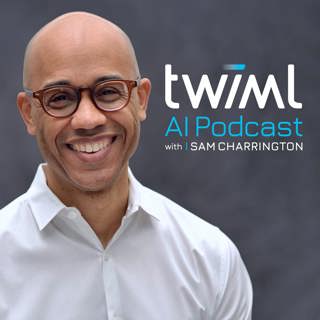
Intelligent Robots in 2026: Are We There Yet? with Nikita Rudin - #760
Today, we're joined by Nikita Rudin, co-founder and CEO of Flexion Robotics to discuss the gap between current robotic capabilities and what’s required to deploy fully autonomous robots in the real world. Nikita explains how reinforcement learning and simulation have driven rapid progress in robot locomotion—and why locomotion is still far from “solved.” We dig into the sim2real gap, and how adding visual inputs introduces noise and significantly complicates sim-to-real transfer. We also explore the debate between end-to-end models and modular approaches, and why separating locomotion, planning, and semantics remains a pragmatic approach today. Nikita also introduces the concept of "real-to-sim", which uses real-world data to refine simulation parameters for higher fidelity training, discusses how reinforcement learning, imitation learning, and teleoperation data are combined to train robust policies for both quadruped and humanoid robots, and introduces Flexion's hierarchical approach that utilizes pre-trained Vision-Language Models (VLMs) for high-level task orchestration with Vision-Language-Action (VLA) models and low-level whole-body trackers. Finally, Nikita shares the behind-the-scenes in humanoid robot demos, his take on reinforcement learning in simulation versus the real world, the nuances of reward tuning, and offers practical advice for researchers and practitioners looking to get started in robotics today. The complete show notes for this episode can be found at https://twimlai.com/go/760.
8 Jan 1h 6min
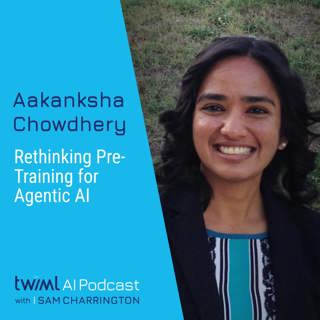
Rethinking Pre-Training for Agentic AI with Aakanksha Chowdhery - #759
Today, we're joined by Aakanksha Chowdhery, member of technical staff at Reflection, to explore the fundamental shifts required to build true agentic AI. While the industry has largely focused on post-training techniques to improve reasoning, Aakanksha draws on her experience leading pre-training efforts for Google’s PaLM and early Gemini models to argue that pre-training itself must be rethought to move beyond static benchmarks. We explore the limitations of next-token prediction for multi-step workflows and examine how attention mechanisms, loss objectives, and training data must evolve to support long-form reasoning and planning. Aakanksha shares insights on the difference between context retrieval and actual reasoning, the importance of "trajectory" training data, and why scaling remains essential for discovering emergent agentic capabilities like error recovery and dynamic tool learning. The complete show notes for this episode can be found at https://twimlai.com/go/759.
17 Dec 202552min
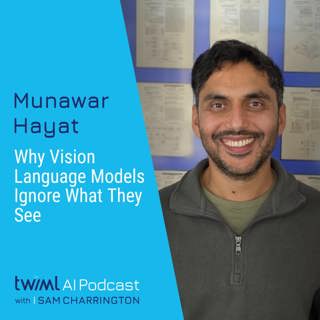
Why Vision Language Models Ignore What They See with Munawar Hayat - #758
In this episode, we’re joined by Munawar Hayat, researcher at Qualcomm AI Research, to discuss a series of papers presented at NeurIPS 2025 focusing on multimodal and generative AI. We dive into the persistent challenge of object hallucination in Vision-Language Models (VLMs), why models often discard visual information in favor of pre-trained language priors, and how his team used attention-guided alignment to enforce better visual grounding. We also explore a novel approach to generalized contrastive learning designed to solve complex, composed retrieval tasks—such as searching via combined text and image queries—without increasing inference costs. Finally, we cover the difficulties generative models face when rendering multiple human subjects, and the new "MultiHuman Testbench" his team created to measure and mitigate issues like identity leakage and attribute blending. Throughout the discussion, we examine how these innovations align with the need for efficient, on-device AI deployment. The complete show notes for this episode can be found at https://twimlai.com/go/758.
9 Dec 202557min
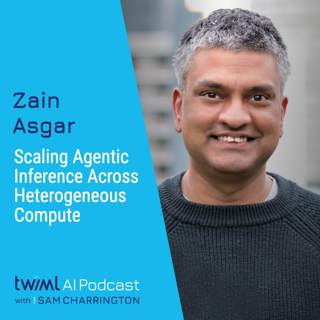
Scaling Agentic Inference Across Heterogeneous Compute with Zain Asgar - #757
In this episode, Zain Asgar, co-founder and CEO of Gimlet Labs, joins us to discuss the heterogeneous AI inference across diverse hardware. Zain argues that the current industry standard of running all AI workloads on high-end GPUs is unsustainable for agents, which consume significantly more tokens than traditional LLM applications. We explore Gimlet’s approach to heterogeneous inference, which involves disaggregating workloads across a mix of hardware—from H100s to older GPUs and CPUs—to optimize unit economics without sacrificing performance. We dive into their "three-layer cake" architecture: workload disaggregation, a compilation layer that maps models to specific hardware targets, and a novel system that uses LLMs to autonomously rewrite and optimize compute kernels. Finally, we discuss the complexities of networking in heterogeneous environments, the trade-offs between numerical precision and application accuracy, and the future of hardware-aware scheduling. The complete show notes for this episode can be found at https://twimlai.com/go/757.
2 Dec 202548min
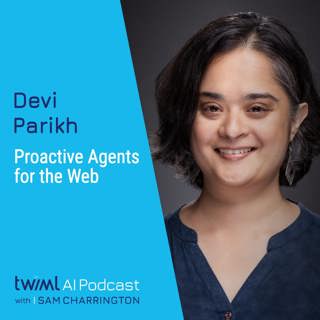
Proactive Agents for the Web with Devi Parikh - #756
Today, we're joined by Devi Parikh, co-founder and co-CEO of Yutori, to discuss browser use models and a future where we interact with the web through proactive, autonomous agents. We explore the technical challenges of creating reliable web agents, the advantages of visually-grounded models that operate on screenshots rather than the browser’s more brittle document object model, or DOM, and why this counterintuitive choice has proven far more robust and generalizable for handling complex web interfaces. Devi also shares insights into Yutori’s training pipeline, which has evolved from supervised fine-tuning to include rejection sampling and reinforcement learning. Finally, we discuss how Yutori’s “Scouts” agents orchestrate multiple tools and sub-agents to handle complex queries, the importance of background, "ambient" operation for these systems, and what the path looks like from simple monitoring to full task automation on the web. The complete show notes for this episode can be found at https://twimlai.com/go/756.
19 Nov 202556min
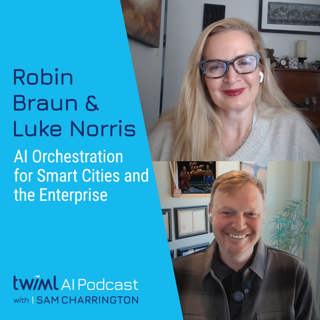
AI Orchestration for Smart Cities and the Enterprise with Robin Braun and Luke Norris - #755
Today, we're joined by Robin Braun, VP of AI business development for hybrid cloud at HPE, and Luke Norris, co-founder and CEO of Kamiwaza, to discuss how AI systems can be used to automate complex workflows and unlock value from legacy enterprise data. Robin and Luke detail high-impact use cases from HPE and Kamiwaza’s collaboration on an “Agentic Smart City” project for Vail, Colorado, including remediation and automation of website accessibility for 508 compliance, digitization and understanding of deed restrictions, and combining contextual information with camera feeds for fire detection and risk assessment. Additionally, we discuss the role of private cloud infrastructure in overcoming challenges like cost, data privacy, and compliance. Robin and Luke also share their lessons learned, including the importance of fresh data, and the value of a "mud puddle by mud puddle" approach in achieving practical AI wins. The complete show notes for this episode can be found at https://twimlai.com/go/755.
12 Nov 202554min

Building an AI Mathematician with Carina Hong - #754
In this episode, Carina Hong, founder and CEO of Axiom, joins us to discuss her work building an "AI Mathematician." Carina explains why this is a pivotal moment for AI in mathematics, citing a convergence of three key areas: the advanced reasoning capabilities of modern LLMs, the rise of formal proof languages like Lean, and breakthroughs in code generation. We explore the core technical challenges, including the massive data gap between general-purpose code and formal math code, and the difficult problem of "autoformalization," or translating natural language proofs into a machine-verifiable format. Carina also shares Axiom's vision for a self-improving system that uses a self-play loop of conjecturing and proving to discover new mathematical knowledge. Finally, we discuss the broader applications of this technology in areas like formal verification for high-stakes software and hardware. The complete show notes for this episode can be found at https://twimlai.com/go/754.
4 Nov 202555min

High-Efficiency Diffusion Models for On-Device Image Generation and Editing with Hung Bui - #753
In this episode, Hung Bui, Technology Vice President at Qualcomm, joins us to explore the latest high-efficiency techniques for running generative AI, particularly diffusion models, on-device. We dive deep into the technical challenges of deploying these models, which are powerful but computationally expensive due to their iterative sampling process. Hung details his team's work on SwiftBrush and SwiftEdit, which enable high-quality text-to-image generation and editing in a single inference step. He explains their novel distillation framework, where a multi-step teacher model guides the training of an efficient, single-step student model. We explore the architecture and training, including the use of a secondary 'coach' network that aligns the student's denoising function with the teacher's, allowing the model to bypass the iterative process entirely. Finally, we discuss how these efficiency breakthroughs pave the way for personalized on-device agents and the challenges of running reasoning models with techniques like inference-time scaling under a fixed compute budget. The complete show notes for this episode can be found at https://twimlai.com/go/753.
28 Okt 202552min
